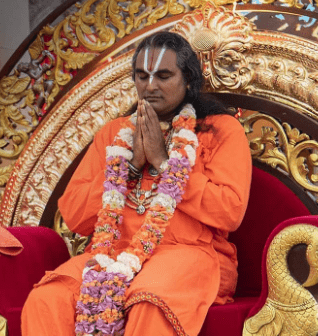What Is Your Dharma?
Each of us are born with certain unique qualities. We each have a role to play in this world, and we can see this role as our personal dharma. When the demands of modern life leave us feeling exhausted and depressed, dharma is the vehicle by which we can regain a sense of purpose in our lives. Dharma is what restores order and balance when we feel lost in the chaos of this material world.
The first step towards living a dharmic life is acceptance.
The mind wanders in many directions, filled with worry, but the past is already gone, and the future is unknown. It is only in the present moment that change can begin to take shape. Grounded in the present moment, accepting how we are, and trusting the tasks that have been given to us today, we begin to establish dharma.
In the Bhagavad Gita, Krishna guides Arjuna on a journey of love and understanding of dharma. Lord Krishna explains that the Divine is present in whatever we are doing. Whatever our career or life path, every chore and responsibility is infused with the love of God and therefore has a higher purpose than what we can perceive.
Krishna said that we should accept and perform our duty as it is, but keep our minds fixed on Him. In this way, our work becomes an act of worship. Detached from the world, with our minds on the Divine, unconditional love begins to flourish.
Living Your Personal Dharma
- Accept yourself and your duty as they are.
- Keep your mind fixed on the Divine at all times.
- Perform every action as loving service.
What Is The Dharma Of The Soul?
The dharma of the individual involves the use of our natural abilities to serve God in our day-to-day lives. However, there is a deeper understanding of dharma known as universal dharma or the dharma of the soul.
In the Gita, after Lord Krishna speaks to Arjuna about his duty in the outside world, His guidance continues. We are again invited to go inward and rediscover who we truly are. This is the essence of the Bhagavad Gita and the dharma of the soul.
So, who are we, truly?
In Hinduism, we understand the soul in the context of reincarnation. The soul is the unchanging, eternal, innermost radiant essence of a living entity. It is a spark of God, and as such, it has all the qualities of the Supreme Self. The soul is forever free and perfect. Through our spiritual practice, we purify ourselves so that this true state can be rediscovered.
The Bhagavad Gita tells us that, although we must perform our duty in the outside world, we should always remember that our true goal is something eternal and unbound. Through deep longing, love, and sincerity, we attain the grace of the Divine. Through His grace, we become liberated from the cycle of births and deaths.
A liberated soul dwells in supreme bliss. These beautiful souls are completely in tune with the Divine will. Their very presence radiates unconditional love and harmony.
'Focus your mind on Me, be devoted to Me, offer worship to Me, bow down to Me. Engaging your mind in this manner and regarding Me as the supreme goal, you will come to Me.' Bhagavad Gita, 9.34
Understanding Universal Dharma
- The soul is a spark of God.
- By cultivating a loving relationship with God, we attain His grace.
- Through His grace, we are liberated.
Dharma As A Way Of Living
Which behaviours and attitudes are considered dharmic?
So far we have looked at dharma as the underlying purpose behind our day-to-day tasks, and we have looked at the universal dharma of God-realisation. Now we will look at dharma as a lifestyle and a code of conduct. This section is all about the practical qualities and behaviours we can embrace in order for dharma to take root in our lives.
The Padma Purana gives us an expanded understanding of dharma in the form of 12 pillars:
- Purity: Cultivate a pure and healthy body and mind.
- Worship: Worship God through rituals as a way to develop love and humility.
- Austerity: Develop self-discipline and self-improvement through spiritual practice.
- Self-restraint: Control your behaviours, and act out of duty rather than desire.
- Study: Study scriptures and practice self-analysis.
- Contentment: Develop a peaceful disposition; accepting the pleasant and unpleasant with equanimity.
- Non-violence: Refrain from engaging in violent acts of aggression, either in thoughts, speech, or action.
- Truth: Speak the truth when beneficial, do not confuse opinions and facts, and differentiate between the real and the unreal.
- Generosity: Whatever you have in excess, share with those who are in need.
- Non-stealing: Refrain from taking anything that is not given.
- Forgiveness: Practice forgiveness and tolerance which come from loving-kindness and compassion for all beings.
- Veneration for Guru: Honor the Guru by listening and acting according to His wish.
These 12 pillars of dharma, once adopted, create the optimal conditions for attaining the supreme reality. By upholding these qualities, behaviors, and virtues in our own lives, we will improve our quality of life as well as the lives of others.

Discover Your Dharma
The Bhagavad Gita highlights the nature of God in-depth, how to relate to Him, and the nature of this world. It answers questions we all ask about the purpose of life and living your dharma. Discover the answer to how to live your dharma without attachment by downloading the audio below!
It is the perfect companion for spiritual practitioners reading the Bhagavad Gita, who wish to overcome life’s difficulties and live a dharmic lifestyle that benefits the world.








